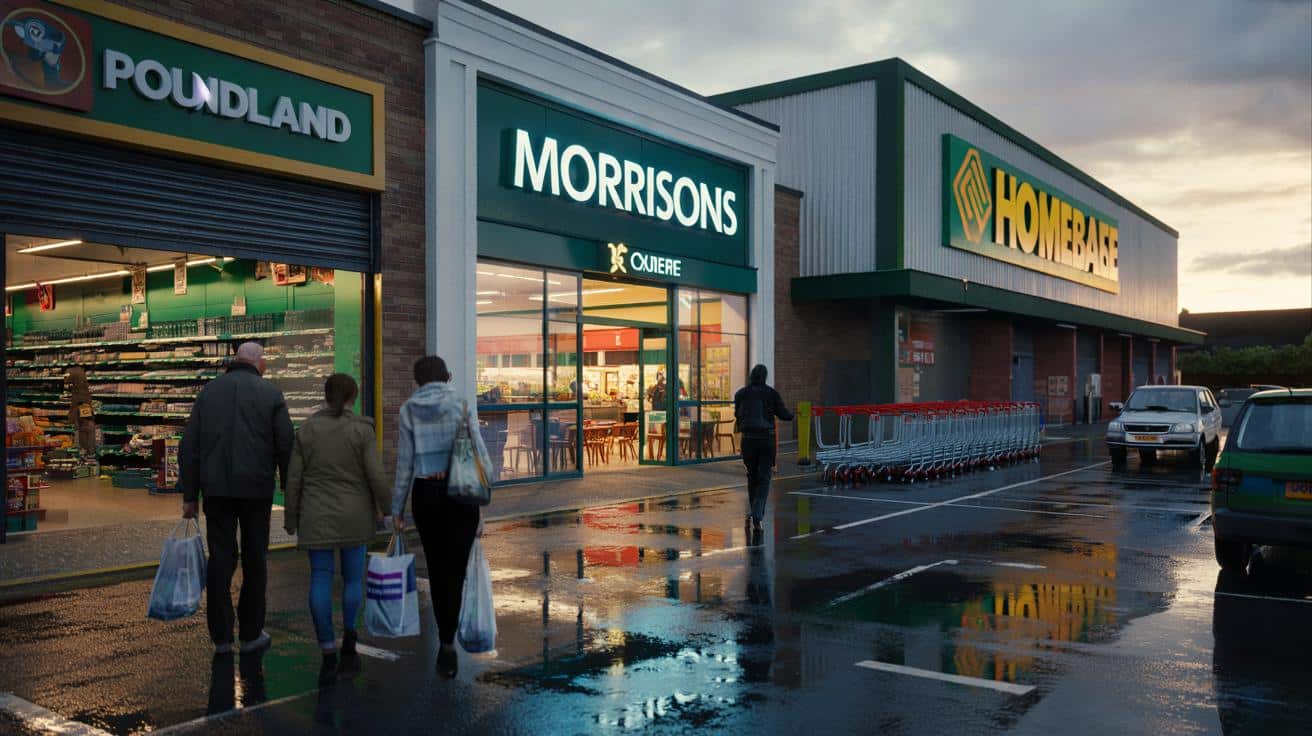Three familiar names now map out a leaner year. The plans trim cafés, counters and smaller stores, and shift trade to busier sites.
What’s closing and where
Morrisons, Poundland and Homebase will collectively shut 201 outlets across the UK in 2025. The list spans supermarkets’ in‑store cafés and counters, convenience branches, and large DIY sheds. Closures spread from city centres to retail parks and neighbourhood parades, so many routines will change.
201 confirmed and expected closures across Morrisons, Poundland and Homebase will reshape local shopping for millions in 2025.
Morrisons will close selected Morrisons Daily convenience stores and a long run of cafés. It will also scale back service counters and some pharmacies. Poundland, now controlled by Gordon Brothers after a £1 sale from Pepco, targets more than 50 store exits. The chain plans clusters of departures in the autumn months. Homebase has already shut 65 large branches after entering administration and now sits within CDS Superstores, owner of Wilko and The Range. Some former Homebase units now trade under rival banners such as B&Q or Sainsbury’s.
Why this is happening
Costs keep rising. Energy bills, rents, rates and wages squeeze margins. Shoppers now blend online orders with fewer, more targeted store trips. That shift limits footfall at smaller or overlapping locations. Chains prefer to concentrate trade into stronger hubs. They cut duplication and renegotiate leases that no longer stack up.
Convenience formats grew fast during the pandemic. Demand has settled. Supermarket cafés and counters use staff and floor space that could hold core lines. DIY demand cooled after the home improvement boom. Big boxes look oversized in some towns. Boards now trim estates to fit today’s trade.
What each chain plans next
Morrisons is pushing investment into larger, busier supermarkets and price battles with discounters. It will keep grab‑and‑go food and prune slower café, counter and pharmacy services. That brings more space for value lines and meal deals near the front of stores.
Poundland is tidying its map under new ownership. It will remove overlapping high street units, unwind higher‑rent sites and back strong retail park locations. Management wants fuller baskets in fewer shops rather than light trade in many.
Homebase, now under CDS Superstores, has cut deep. Its estate shrank through closures and unit transfers to rivals. The remaining stores sit alongside Wilko and The Range within one portfolio. That opens options to repurpose space or swap fascias where trade warrants it.
| Retailer | What’s affected | Numbers | Status |
|---|---|---|---|
| Morrisons | Convenience stores, cafés, service counters, pharmacies | 69+ named so far | 17 convenience stores and 52 cafés identified; more counters at risk |
| Poundland | High street and retail park branches | 50+ expected | Further sites planned around October and November |
| Homebase | Large‑format DIY and garden stores | 65 closed | Brand moved to CDS Superstores; some units reassigned to rivals |
| Total | All three | 201 | National impact across towns and cities in 2025 |
Towns already named
Not every branch is going, but many communities face changes. Here are examples flagged by the retailers.
Morrisons and cafés
- Convenience stores in Bath (Moorland Road), Wokingham (Peach Street), Romsey and Poole
- Cafés at London Wood Green, Glasgow Newlands, Leeds Horsforth and Watford Ascot Road
- Further café closures at East Kilbride, Sidcup Westwood Lane and Helensburgh
Poundland
- High street sites in Cardiff, Leicester and Tunbridge Wells
- Retail park branches at Hull St Andrew, Peterborough Orton Gate and Sunderland Pallion
- Swiss Cottage, Blackpool Cherry Tree Retail Park, Deal and Carlisle among dated exits
- Sidcup, Peckham and Launceston also listed
Homebase
- Closures across Bradford, Cheltenham and Coventry
- Further exits in Romford, Truro and Leeds
- Additional sites at Milton Keynes, Orpington, Omagh and Londonderry
Homebase has shut 65 stores following administration, while new owners say dozens of branches were saved or reassigned.
What this means for shoppers
Pharmacy closures will move prescriptions to other branches or GP‑nominated alternatives. Café shutdowns remove low‑cost meals and warm spaces used by families and older residents. Fewer DIY sites can add travel time and complicate click‑and‑collect for bulky goods.
- Gift cards: spend them early at closing shops or use them online where valid; confirm cut‑off dates with staff.
- Prescriptions: request an electronic transfer and check new opening hours before you travel.
- Returns: keep receipts handy; winding‑down stores may change deadlines.
- Click and collect: redirect to a nearby branch or switch to home delivery if your pickup point disappears.
- Travel costs: factor in fuel, bus fares and parking when your nearest option moves further away.
- Clearance: watch for markdowns on seasonal and bulky lines at stores that are closing.
Impact on staff and town centres
Teams face redundancy consultations, though some workers move to nearby branches or successor tenants. Councils will track footfall and empty units. Quick re‑letting to discounters, gyms, clinics or community uses can steady neighbouring trade. Long vacancies risk blight and lower confidence for local investors.
How to check your local store status
Look for in‑store posters with final trading dates. Ask customer services to confirm last days for cafés and counters, which often differ from main store closures. Community groups on social channels usually share reliable updates on temporary relocations, pharmacy alternatives and return windows.
Planning ahead: quick wins for households
Map your weekly errands to cut time and fuel. Combine a grocery run with a pharmacy stop and a discount‑shop visit. If a branch moves, check delivery thresholds for heavy DIY items; the delivery fee can be cheaper than two car trips.
Price‑match schemes and own‑label ranges can cushion the switch to a new supermarket. If you rely on a niche item, note the barcode, and ask the new store to order it. Independents sometimes fill the gaps left by closures. They may charge more on some lines but often source parts fast for one‑off jobs.
A five‑minute cost check you can run
- Fuel: add 8 extra miles per round trip at 40 mpg and £1.45 per litre. You pay roughly £1.30 more.
- Parking: two £2 short stays per week add £16 a month. Look for free windows or park‑and‑ride.
- Delivery: if a DIY basket tops a £50 threshold, many chains waive a £5‑£10 fee. That can beat the drive.
- Time: a 20‑minute detour twice a week equals nearly 3 hours a month. Batch errands to claw back time.
What to expect next
More detail will drip through store posters and updated lists during the year. Morrisons will keep edging space towards value, fresh, and food‑to‑go. Poundland will trim weaker high streets and back busier parks. CDS will decide how Homebase sites sit alongside Wilko and The Range, and where to rebrand or repurpose space.
Households can use this period to test new routines. Try a different supermarket for a week. Compare a retail park basket to a high street one. Check whether your GP offers electronic prescriptions by default. Small switches can offset longer journeys and help keep budgets steady while the high street reshapes.








